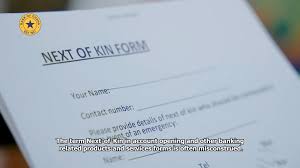Next of kin won’t access your bank money

Why your next of kin doesn’t secure your bank money
If you passed away today, the name listed as your next of kin would not automatically inherit the money in your bank account.
That’s a hard truth many Ghanaians don’t know.
Unless that person is a joint account holder or has legal authority through a written will, they won’t have access—regardless of their relationship to you.
Banks are legally bound to freeze the account until a formal court process known as probate is completed. This isn’t a quick fix. It’s a drawn-out legal process where the courts determine who deserves to inherit your funds.
Probate is expensive and slow
The probate system exists to prevent fraud and ensure only legal heirs receive assets. But it comes at a cost—both in time and money.
Your family may need months to get through the paperwork and court steps. In the end, a portion of the account is usually taken to cover legal and administrative fees.
So while they’re grieving, they also lose a significant chunk of the money you intended for them.
How to protect your loved ones the smart way
There’s a better way—and it’s called POD, or Payable on Death.
Visit your bank and request a POD form. On that form, list the exact person you want to receive the funds when you’re no longer around.
That individual won’t need lawyers or legal clearance. All they’ll need to present is your death certificate. No probate. No delay. No deductions.
With a POD in place, the money will go straight to the person you intended—without the drama or legal fees.
Time to act now
It’s not enough to list someone as your next of kin. That title means nothing without legal or banking authority. If you truly want to protect your family’s financial future, walk into your bank and complete a POD form today.
Don’t leave it to chance. Don’t leave them to struggle. Take action while you still can.




